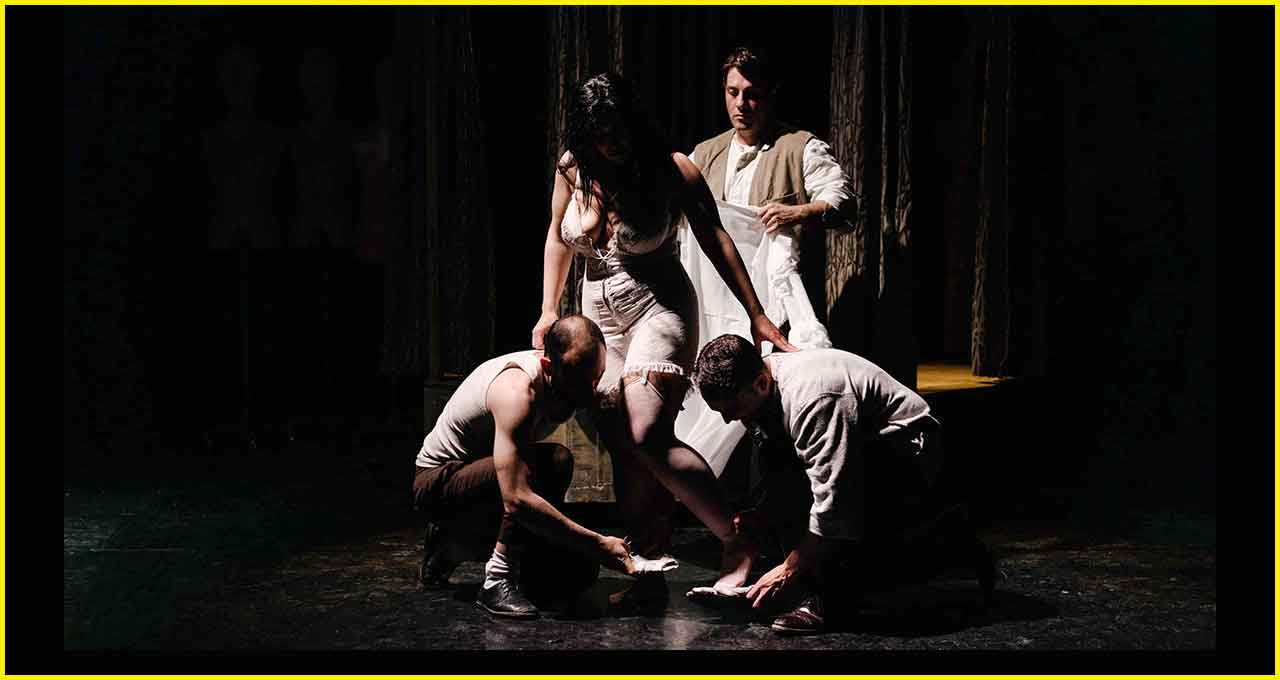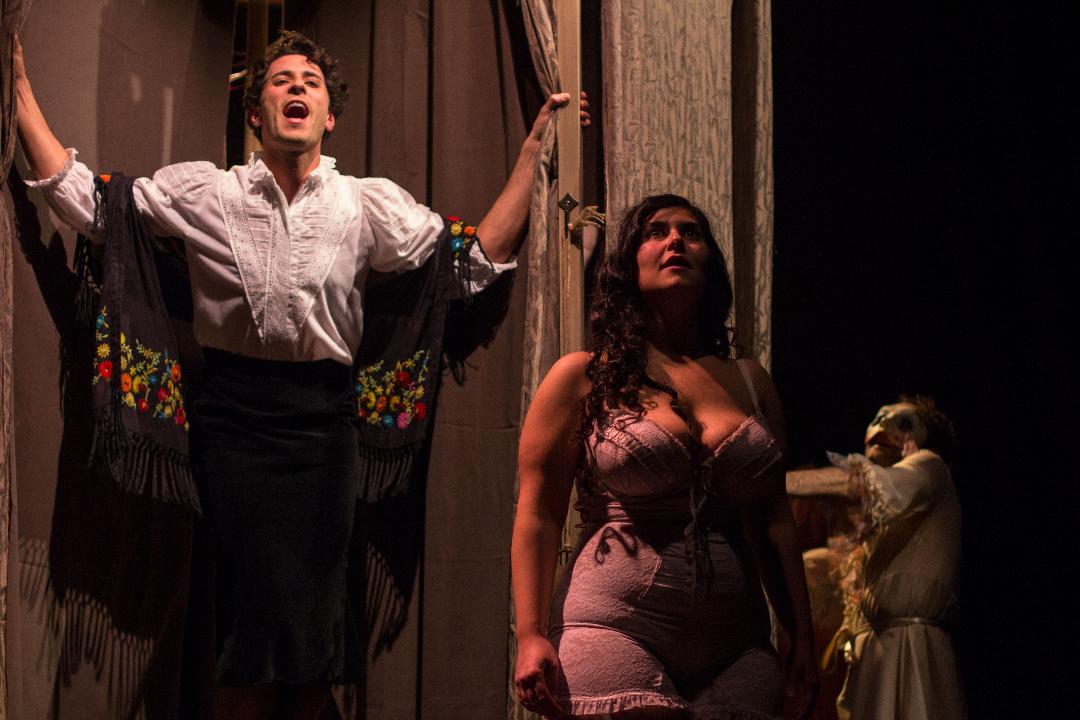Love is staged, the carnal and the more spiritual, al Sala Umberto Theater From Rome. To bring it to us is Immaculate Conceptiona show by Vucciria Theaterdirected by Joele Anastasi was born from an idea of Federica Carruba Toscano who also plays the role of the protagonist.
Concetta (Federica Carruba Toscano) is an earthquake generated by the encounter between spirituality and carnality. She enters the scene by crossing the audience completely naked, dressed only in her innocence with long dark hair barely covering her florid breasts and a clean and unaware smile, dragged with a cowbell around her neck like an animal by a father who, lost all his goats, gives it to Mrs. Anna (Joele Anastasi), the maîtresse of the brothel, in exchange for a pregnant goat and the hope of restarting the business that provided a source of sustenance for the whole family.
This is how the public meets this silent girl, so much so that she has the reputation of not being too intelligent, who always smiles with the innocence and unawareness of children and of those who do not know neither the wickedness nor the malice and the pleasures of the flesh. She goes to the gallows with a smile on her lips, like a ‘goat to be slaughtered’ with a woman’s body – with undeniable beauty and sensuality – but the innocence and purity of a child.
photo Dalila Romeo
photo Dalila Romeo
photo Dalila Romeo
She is the latest arrival among Donna Anna’s young ladies but her fame grows quickly and relentlessly, after all – as De André used to sing about another young lady in other times – “a somewhat original piece of news, does not need no newspaper, like an arrow from the bow fires, flies fast from mouth to mouth ”.
Customers are delighted with Concetta and want only her, to the anger of the other young ladies who wonder about which strange maverie and what secrets the newcomer hides to be such a success. Among the most loyal customers is don Saro La Rocca (Enrico Sortino), the lord of the country that the rule wants has the right to consume first with every girl in the brothel.
We are in Sicily in the 1940s, as the dialogues between some customers of the closed house remind us in several places. On the stage, to compose the very simple and essential scenography, there is a large carousel closed by curtains that rotates when necessary, the mannequins that together with the other actors of the company (Ivano Picciallo) impersonate the various clients of the young ladies but to really draw the scene are the lights that underline the events and emotions of the protagonists.
Concetta’s skin smells like mandarins, and she particularly loves to eat them. She has the ‘power’ to bewitch the men with whom she – while always remaining faithful to the seven house rules – she never tires of ‘making love’. Activity that, we will discover only later, has a very different meaning from what everyone imagines also because of the admirable performances that everyone boasts of having received from her in the brothel room.
Concetta is a virgin, immaculate. She is and makes love but not the carnal, profane and passionate one you would expect from a woman who sells her body.
She makes love to her clients by shaving them, playing with them to fight by hosting their tears on her chest, those tears that as men could not shed in public.
She, with her innocence, “feels” the soul of her clients and reveals their hidden fragility. She is made a saint – as she herself will say in an exciting monologue, masterfully recited by Federica Carruba Toscano who, throughout the show, gives her character a truly remarkable depth and depth – by those men because she looked at them in the eyes for the first time, because it gave them the opportunity to cry, laugh and not lose their manhood “because they want to make war. They have the sea in their eyes that everyone wants to drown us. And I ficiru holy because I did not addumandava nothing. [..] I don’t get tired, I will never get tired. My name is love, I am immaculate .. Immaculate conception“.
All men go crazy for her and would like her all to themselves, as if it were an object of inestimable value or a sacred image to be venerated so much that the curate of the town (Ivano Picciallo) does not want to “dirty” the image of pure creature prefers – unlike what she does with the other young ladies – not to listen to their confessions.
First of all, don Saro who instructs the ‘godson’ Turi (Alessandro Lui) to watch over the girl without having carnal relations with her as this would sound like a betrayal to him, almost an incest since for him the young man is almost a son. Concetta’s “magic” does not, however, leave even Turi immune who – reciprocated – binds herself to her young woman so much as to ‘make love with her’ telling her the story of Colapesce but also taking her carnally with her violence. A single act of carnal love that will transform her from a “goat to be slaughtered” into a “goat to have children”. A gestation that will come even further to sublimate love in Concetta in the most sacred and pure meaning that can be imagined.
Immaculate Conception brings to the stage, as told by the director and playwright Joele Anastasi, “the power and the cult of the image which, coming to dehumanize a living body to transform it into a fetish, is subject to the need to establish a relationship based on the unexpressed desires of the just unconscious “.
Concetta is, we still read in the director’s notes, «the saint of the flesh and tells what earthquake can generate the encounter between spirituality and carnality on the level of the community. The 1940s represent an essential watershed in the history of mankind. The advent of the Second World War, with all that it has caused, revealed how the human being himself was brutally reified and desacralized.
From that historical moment the very vision of humanity, both in relations between people and in the relationship with power, will change profoundly and the very concept of the sacred will cease to have a correspondence in the plane of reality.
The play, therefore, shows the pivot point of a social system in which relationships would still like to be produced rather than brutally consumed. Although they tell of a world in which the future and hope can still exist, they already contain the germ of that sick drift that will find a possibility of expression in the world conflict and in totalitarian regimes ».
Once again the Vucciria Teatro company confronts itself on stage with an intimate and raw theme but once again it proves to be up to the task by not betraying the expectations of the public who instead comes out of the theater bringing with it the emotion of an exciting story and not. banal that touches deep chords of the human soul such as the need to be loved beyond the social mask that one wears and the possibility in true and disinterested love to bare even one’s frailties being able to count on a caress like those that Concetta he offers his clients in “making love” in his own way with them.

Born in 1987, Roman by birth and Sicilian by origin. Freelance communicator and press officer. After her classical studies, she graduated in Languages and International Communication (curriculum Operators of intercultural communication) and later, at the University “La Sapienza” in Rome, she specialized in journalism, graduating with a thesis on journalism on earth of the Camorra. She press office and social media manager for festivals, events and associations in particular in the cultural and theatrical fields as well as for Europride 2011, Trame-Festival of books on mafia and for the Omniroma press agency. You collaborate with various newspapers dealing in particular with social, cultural and political issues (from gender issues to social anti-mafia through immigration, the LGBTQI world and that of civil rights). She has always been passionate about (inter) culture, music, web, languages, languages and words.



